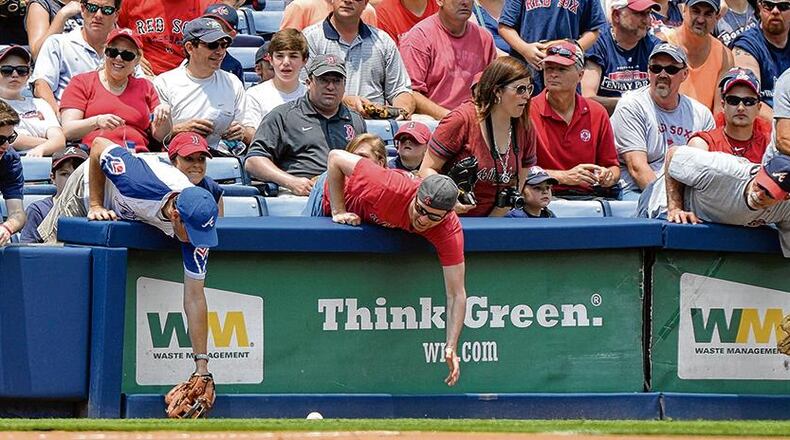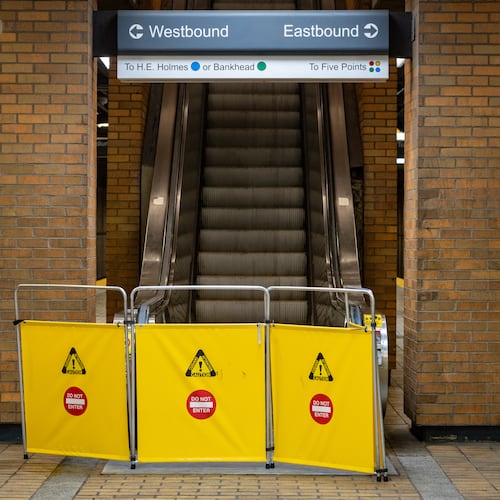The Atlanta Braves have lost a key court ruling in a lawsuit over the foul ball that grievously injured a child at Turner Field.
The Georgia Court of Appeals on Friday allowed the lawsuit, involving a 6-year-old girl whose skull was shattered by a foul ball in 2010, to proceed toward trial.
The Braves, joined by Major League Baseball Commissioner Bud Selig, had asked the court to recognize the so-called "Baseball Rule" as the law in Georgia. The rule, already in force in other states but not here, says if a stadium operator provides adequate screening behind home plate, and enough seats for spectators who want to sit there, it cannot be held liable for balls and bats that enter the stands and hurt people.
But the appeals court said it found no reason to reverse a Fulton County judge, who declined to adopt the Baseball Rule.
“(S)uch relief is not appropriate at this stage of the proceedings,” Judge Elizabeth Branch wrote in a unanimous opinion joined by Judges Anne Elizabeth Barnes and Michael Boggs. Branch noted that the Braves had to show “extraordinary facts” to support their motion but failed to do so.
The lawsuit was filed by Fred Fletcher, who had taken his daughter to a 2010 game at Turner Field. During the game, Braves outfielder Melky Cabrera hit a foul ball that struck the girl in the forehead, fracturing her skull in 30 places and causing traumatic brain injury. The girl was seated with her parents, who had received the tickets as a gift, just a few rows behind the dugout on the third-base side.
Netting for players but not for fans
In the ruling, Branch noted that sometime before the 2010 season, the Braves added netting to portions of both dugouts to protect players from foul balls. But they didn’t extend that netting to the seats behind the dugouts, Branch said.
“We, of course, agree with and appreciate the Court of Appeals’ decision to allow the case to continue,” said Atlanta lawyer Mike Moran, who represents Fletcher. “We believe there is no compelling public policy reason for courts to grant the Braves and their owner Liberty Media de facto immunity from claims when children are seriously injured in these seats.”
Former Georgia Supreme Court Chief Justice Leah Ward Sears, who represents the Braves, referred questions to the ball club. The team has no comment, Braves spokeswoman Beth Marshall said.
The Braves could ask the Georgia Supreme Court to take up the issue or ask a Fulton County judge to dismiss the case during a later stage of the litigation.
Field-level seats that are not shielded by the netting behind home plate can be hazardous territory. Just weeks after the 6-year-old girl was injured at Turner Field, a woman attending a baseball game in San Angelo, Texas, died after a foul ball hit her in the head.
The back of all MLB tickets warns fans they assume all risk and danger incidental to the sport. Teams also flash warnings on scoreboards, telling fans to stay alert.
But such warnings may not apply to children. In May, an 8-year-old boy seated behind the Braves’ dugout was struck in the head by a foul ball. Play was briefly stopped as horrified players watched the stricken child being carried by his father out of the stands. He was treated at a hospital and released.
At field level, hoping for a foul
The Braves and MLB argued that fans know they’re assuming some risk and said many opt for field-level seats for the very reason that a foul or tossed ball might come their way. If the Baseball Rule is not enforced, the team said, it may have to raise ticket prices or restrict where children can sit.
In court filings, Moran countered that adoption of the Baseball Rule would forever lock in place limited safety measures no matter how future stadiums are configured and no matter how dangerous the game becomes to spectators. And, he asked, if the Braves recognize that world-class athletes sitting in dugouts need protective netting because they can’t react quickly enough to get out of the way, why doesn’t the team extend netting behind the dugout to protect fans?
The Baseball Rule has been in effect in a number of states dating back at least eight decades. Among those states with the rule: Minnesota, Michigan, New York, Ohio and California.
But in recent years, two states’ appellate courts refused to adopt it.
In February 2013, the Idaho Supreme Court said state lawmakers were better suited than the courts to create such a rule. Because the court was never provided statistical evidence about the prevalence of foul ball injuries, “drawing lines as to where a stadium owner’s duty begins, where netting should be placed, and so on, becomes guesswork,” the court said
In that decision, the court declined to dismiss a lawsuit filed by a man who was struck by a foul ball and lost his eye at a minor league game in Boise.
Last month, the Indiana Supreme Court declined the South Shore RailCats’ request to adopt the rule in a lawsuit brought by a woman who was blinded in the left eye after being hit by a foul ball at the minor league team’s opening day game in 2009. “We are not convinced that any sport, even our national pastime, merits its own special rule of liability,” the court said.
About the Author
The Latest
Featured



